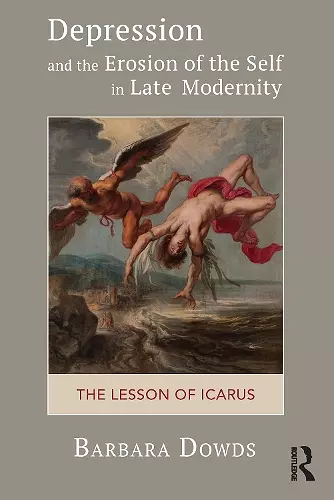Depression and the Erosion of the Self in Late Modernity
The Lesson of Icarus
Format:Paperback
Publisher:Taylor & Francis Ltd
Published:31st Oct '17
Currently unavailable, and unfortunately no date known when it will be back

Depression is not a disease of the brain, a genetic disability or even a mood disorder. Rather, shutdown, numbness or sadness are non-pathological adaptations to adverse childhood and adult environments. This challenging book thus understands depression as a wise response to an unliveable situation. It can teach us what is wrong with our lives and what we must learn in order to go beyond symptom relief and reconnect to our most fundamental needs, relational, existential and spiritual. Because moods shape how we engage with our outer and inner worlds, they underlie all human behaviour. If the sociocultural world is toxic or frustrates our core needs, we will withdraw to protect ourselves. Those who have encountered a non-facilitating environment in childhood will be even more sensitive to adult stresses, since their self-organisation is fragile and non-resilient. As depression is so complex, understanding it demands an integrative approach. Adopting a biopsychosocial perspective with an environmentalist emphasis, this study articulates a variety of levels: experiential, psychodynamic, developmental, evolutionary, neuroscientific, genetic and societal. In particular the impacts of the social changes in the late twentieth and early twenty-first centuries are invoked in an attempt to explain the ongoing escalation of depression worldwide.
Barbara Dowds brings a wealth of disciplinary perspectives to the subject of depression. Alongside analysing 21 published memoirs of depression, and sensitively demonstrating depression’s many nuances, she threads in relevant psychotherapeutic theory, and discusses a biopsychosocial model rooted in early life experiences. Dowds concisely presents evolutionary, neuroscience, genetic, epigenetic and microbiological factors. Linking these foci with social breakdown phenomena, she examines depression as a disorder of the self. This book is surely one of the most passionate, intelligent and hopeful contributions to our understanding of an accelerating modern epidemic. It deserves the attention of all mental health professionals, social scientists and enquiring individuals.
Colin Feltham, Emeritus Professor, Sheffield Hallam University. His most recent works are Feltham, C. (2017) Depressive Realism: Interdisciplinary Perspectives (Routledge) and Sarraf, M., Woodley of Menie, M. & Feltham, C. (forthcoming) Modernity, Nihilism and Mental Health (Routledge).
This book's deep, multifaceted exploration of depression challenges our current thinking. For Barbara Dowds, depression is not so much about 'mood' or genes as it is about the problem of getting innate human needs met. Dowds is equally at home whether she is discussing this in terms of early child development, a loss of connection with others or altered physical sense of self, or depression as the lurking underbelly of our narcissistic and materialistic society. I admire her wide reach and agree with her that the growing epidemic of depression requires social change as well as individual support.
Sue Gerhardt, author of Why Love Matters (Routledge) and The Selfish Society (Simon & Schuster).
Barbara Dowds brings a wealth of disciplinary perspectives to the subject of depression. Alongside analysing 21 published memoirs of depression, and sensitively demonstrating depression’s many nuances, she threads in relevant psychotherapeutic theory, and discusses a biopsychosocial model rooted in early life experiences. Dowds concisely presents evolutionary, neuroscience, genetic, epigenetic and microbiological factors. Linking these foci with social breakdown phenomena, she examines depression as a disorder of the self. This book is surely one of the most passionate, intelligent and hopeful contributions to our understanding of an accelerating modern epidemic. It deserves the attention of all mental health professionals, social scientists and enquiring individuals.
Colin Feltham, Emeritus Professor, Sheffield Hallam University. His most recent works are Feltham, C. (2017) Depressive Realism: Interdisciplinary Perspectives (Routledge) and Sarraf, M., Woodley of Menie, M. & Feltham, C. (forthcoming) Modernity, Nihilism and Mental Health (Routledge)
This book's deep, multifaceted exploration of depression challenges our current thinking. For Barbara Dowds, depression is not so much about 'mood' or genes as it is about the problem of getting innate human needs met. Dowds is equally at home whether she is discussing this in terms of early child development, a loss of connection with others or altered physical sense of self, or depression as the lurking underbelly of our narcissistic and materialistic society. I admire her wide reach and agree with her that the growing epidemic of depression requires social change as well as individual support.
Sue Gerhardt, author of Why Love Matters (Routledge) and The Selfish Society (Simon & Schuster)
ISBN: 9781782205906
Dimensions: unknown
Weight: unknown
336 pages